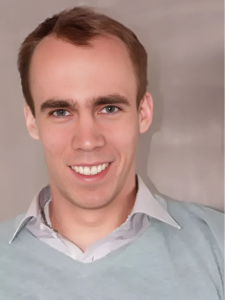Presented By: Michigan Institute for Computational Discovery and Engineering
MICDE-Aerospace Engineering Seminar - Jan Janssen: How to use machine learning in the discovery and design of materials for the future?
Jan Janssen, Max Planck Institute for Sustainable Materials

Bio:
Dr. Jan Janssen is the group leader for materials informatics at the Max Planck Institute for Sustainable Materials in Düsseldorf, Germany. Previously, he was a Director’s Postdoctoral Fellow at Los Alamos National Laboratory, where he designed materials for fusion reactors as part of the Exascale Computing Project. In addition, he leads the development of the open-source pyiron software package, is a maintainer of over 900 open-source software packages for the conda-forge community and an active contributor to open-source projects on Github.
Abstract:
Designing materials for a sustainable future requires rethinking traditional materials design, which is centered on optimizing and fine-tuning already known alloying compositions. In a mathematical sense this can be identified as a local or global optimization in the multi-dimensional alloy phase space. To sample the whole periodic table, already a three-component alloy with 20 temperature steps and 10 concentration steps requires a million experiments, making it prohibitive for purely experimental approaches.
To address this challenge, simulation approaches and, more recently, machine learning models are applied to screen the periodic table. The pyiron workflow framework developed at the Max-Planck-Institute for sustainable materials predicts new materials using ab-intio thermodynamics. Starting from the interaction of electrons, it predicts macroscopic material properties like heat capacity, thermal expansion, and phase stability. Recently, the pyiron workflow framework was extended with a large language model (LLM) interface named LangSim.
This raises the question: Can a LLM replace a scientist? Or how does the thought process of a scientist differ from the statistical approach of the LLM? Can the LLM make us better scientists? We benchmark the capabilities of current LLMs to design new materials using atomistic simulation. The presentation introduces ab-initio thermodynamics, covers the importance of simulation workflows to efficiently predict sustainable materials and highlights how LLMs accelerate their discovery.
Dr. Jan Janssen is the group leader for materials informatics at the Max Planck Institute for Sustainable Materials in Düsseldorf, Germany. Previously, he was a Director’s Postdoctoral Fellow at Los Alamos National Laboratory, where he designed materials for fusion reactors as part of the Exascale Computing Project. In addition, he leads the development of the open-source pyiron software package, is a maintainer of over 900 open-source software packages for the conda-forge community and an active contributor to open-source projects on Github.
Abstract:
Designing materials for a sustainable future requires rethinking traditional materials design, which is centered on optimizing and fine-tuning already known alloying compositions. In a mathematical sense this can be identified as a local or global optimization in the multi-dimensional alloy phase space. To sample the whole periodic table, already a three-component alloy with 20 temperature steps and 10 concentration steps requires a million experiments, making it prohibitive for purely experimental approaches.
To address this challenge, simulation approaches and, more recently, machine learning models are applied to screen the periodic table. The pyiron workflow framework developed at the Max-Planck-Institute for sustainable materials predicts new materials using ab-intio thermodynamics. Starting from the interaction of electrons, it predicts macroscopic material properties like heat capacity, thermal expansion, and phase stability. Recently, the pyiron workflow framework was extended with a large language model (LLM) interface named LangSim.
This raises the question: Can a LLM replace a scientist? Or how does the thought process of a scientist differ from the statistical approach of the LLM? Can the LLM make us better scientists? We benchmark the capabilities of current LLMs to design new materials using atomistic simulation. The presentation introduces ab-initio thermodynamics, covers the importance of simulation workflows to efficiently predict sustainable materials and highlights how LLMs accelerate their discovery.